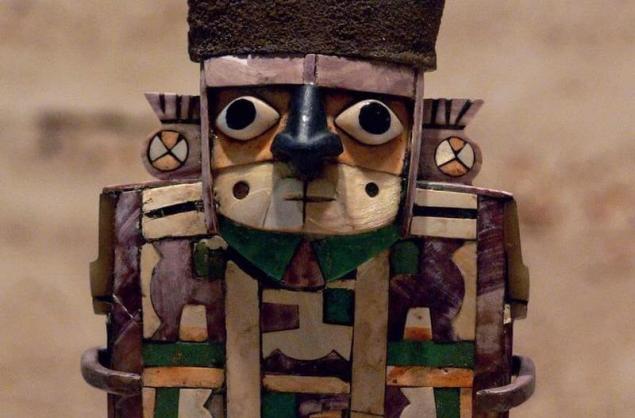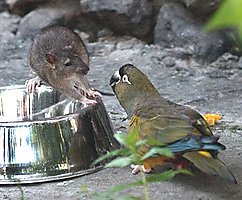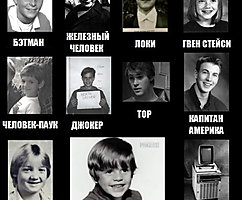5 unusual languages, changes the perception of reality
 Bashny.Net
Bashny.Net
Unusual languages of the world, which confirm the relativity of all things.
30-XX of the last century Edward Sapir and Benjamin Wharf has put forward the fascinating hypothesis of linguistic relativity, according to which language and its expressions in different categories (gender, time, space) affect the way we think about the world. For example, if a language has no words to Express time talking on it the person will not be able to understand the concept of time, or if the language has no words to refer to yellow, the carrier of this language is difficult to differentiate the color among others.
The scientific community reacted to the hypothesis Sepira and worth very skeptical. A comparison of the language world picture of the American Indian (hopi and Paiute, Shawnee, Navajo, etc.) of the linguistic world picture of native speakers of European languages, which has taken the Wharf, seemed scientists are not convincing, and the examples from the category of “in eskimo languages there are dozens of different words to describe snow, whereas in English only one — snow” is treated with irony.

However, thanks to the hypothesis Sepira-Saxon there was a great interest in the study of exotic languages and the study of the relationships that develop between thinking, language and culture of a people.
We suggest considering such a proposal:
I went to my neighbor's house for something to eat yesterday (Yesterday I go (went) to the neighbor (neighbor) something to eat).
Plain English design, but what's to tell us? We don't know the sex of the speaker and his interlocutor, we do not know the direction in which went the subject, and, finally, what he treated himself to a neighbor? English speaking does not require such accurate information, while the same sentence in French or Russian, as a minimum, would include information about the field actors.
This is not the most striking difference, even though it arouses interest and makes you think. However, the relativity best describe the most unusual languages, whose speakers seem to live in some other world.
The language in which you are the center of the universe
Studies have shown that the languages of the world there are different types of orientation: egocentric, landscape and geography. Our attitude is, of course, self-centered here, for all things exist and move relative to the speaker. This is evidenced by the characteristic coordinates: “my right,” “left of me”, “behind”, “ahead” — the whole world revolves around us.
However, aboriginal Australian tribe guugu yimithirr approach “I'm” unlikely to be useful: the members of this tribe are guided by sides of the world, not about themselves. To ask you to move to the right, a man from this tribe would say something like: "could you move a little to the West?".

Linguist guy Deutscher (Guy Deustcher) explains that speakers guugu yimithirr there is a "inner compass" which appears in them from infancy from the very beginning, the brain representatives of the tribe learns to ignore the natural factors, indicating the position in space, and carefully memorize the movement or rotation, that helps aboriginal people without any effort to determine the right direction.
Exactly the same as Russian, English or French at an early age learn to correctly use the time in speech, the children of the tribe guugu yimithirr learn to navigate by the cardinal directions. According to deucher, if a native speaker guugu yimithirr will need to draw your attention to something that is behind him, "he will show himself as if he were just air, and its existence means nothing".
It is unclear whether this language creates feature less self-centered worldview, but other studies have shown that native speakers of languages that use cardinal directions to indicate the location, have an incredible spatial memory, and fantastic navigation skills that we, members of the self-centered model, and did not dream.
The language in which time flows from East to West
Academic from Berkeley Alice Gaby (Gaby Alice) and a linguist from Stanford Boroditsky Lera (Lera Boroditsky) studied language Kuuk Thaayorre, which tells the Australian people of Queensland pormpuraaw. As well as representatives guugu yimithirr, native speakers Kuuk thayorre oriented in the North, South, West and East, but Boroditsky and Gaby also found that members of this tribe totally talking about time: in their language it is located along the axis East — West, and the past is in the East.
During several experiments, the scientists gave members of the tribe series cards, which were drawn or to slowly eat a banana, or a crocodile growing, or gradually ageing people in different ages.
During the experiment, native speakers couk the first Thaayorre sitting face to the North, then face South. But no matter how down these people, they always laid out the pictures from East to West in the same direction in which the sun moves on sky. The bearers of the English language, which also participated in the experiment, always put the card in the same direction in which we read — from left to right.
So the researchers found that the native speakers Kuuk Thaayorre the passage of time is closely connected with the parties of light. Lera Boroditsky notes:
We none of them said which direction they face. But native speakers Kuuk Thaayorre knew that already and spontaneously used the light to Express their ideas about time.
Language, forcing you to provide evidence

Source: wikipedia
It seems that the Indian tribe matses from Peruvian Nuevo San Juan is the most truthful people on earth. Each of them extremely carefully chooses his words to ensure that any information provided is untrue at the time of speech. Depending on how representative matches known this information, he chooses a particular verb form, which indicates the degree of reliability of what was said.
For example, if the Indian matses to ask: "How many apples do you have?", with high probability he will answer something in this way: "the last time I checked the fruit basket, I had four apples". And it is irrelevant that the speaker is 100% sure that he has exactly 4 apples — if he does not see them, then he has no proof of the truth of his words and he has nothing to say.
This feature of Indian matses led to the fact that the language has accumulated a huge number of special terms to refer to facts, assumptions on the different moments in the past and memories.
The linguist David Fleck (David Fleck) from rice University who wrote his doctoral dissertation on the grammar of the language matses, says that in this language, even there is no way to report that particular information is a rumor, a myth or conjecture. This kind of information Indians matches passed as a quote or as information gleaned from the recent past and do not have reinforcement in the present.
The language in which the colors become metaphors

All people see the world in a certain visible spectrum. If you have a healthy retina, the light in contact with it will break up into different colors. Linguists believe that all languages have their own set of words to denote colors, forming a visible color spectrum.
So, in 1969, anthropologist Brent Berlin (Brent Berlin) and the linguist Paul Kay (Paul Kay) created the theory of "basic color terms": they have identified 11 basic colors and offered their hierarchy: (black, white) → (red) → (green, yellow) → (blue) → (brown) → (grey, orange, pink, purple). This hierarchy meant that all languages have at least the word to refer to black and white, and what is less important colors (e.g., grey or brown) occur in the language only if it already exists in color, occupying the higher positions.
But not in the language of Yeli dnye (Yélî Dnye). In 2001, a researcher from the Institute of psycholinguistics of them. Max Planck Stephen Levinson (Steven Levinson) was published in the Journal of Linguistic Anthropology on the island Rossella (Papua-New Guinea), the data which completely refute the theory of Berlin and Kay.
According to Stephen Levinson, language of Yeli dnye spoken by the inhabitants of the island, very few words to denote colors and the word "color" too. But native speakers are not devoid of ideas about the color: they talk about the colors of metaphorical phrases, using to denote items of island life and the environment.
For example, to describe something red islanders use the word "stientje", the syllable of which is "MTE" means a species of red parrot. And the word "midimidi" locals signify something black, from "MIDI" — night. As noted by Levinson, even the grammar of the language Yeli dnye reinforces this tendency to metaphors: instead of saying "This person is white", the Islander uses the comparative structure "the Skin of this man is white as a parrot".
But the tendency of the inhabitants of the island Rossella for metaphors is not a sign that they have developed a special type of view, which no other people. The islanders see colors the same as we are, however, quite differently perceive and interpret the world — and this particular perception is reflected in their specific descriptions. Or Vice versa? How can we once again do not remember Sepira and Worf.
Language which has no numbers, no colors, no concept of “tomorrow”

Source: wpshower.com
The language of piraha say since 2005 — since, as anthropologist Daniel Everett (Daniel Everett) from the University of Manchester published in the journal Current Anthropology their work.
Piraha is a tribe of natives who live in the Amazon, and their language is like no other in the world: it has no words to denote color and kinship, the perfect form of the verb, future tense, numbers, and basic words to refer to quantities such as "some" and "little", despite the fact that, according to most scientists, this all universal aspects present in any language.
Instead of using numerals to indicate quantity information piraha say about the items described as “large” or “small”. They have a word which we could loosely translated as "many", but for them it meant "to join together". In addition, the descriptions of Everett, the Piraha have no profound memories and artistic traditions.
As expressed by Steven Pinker (Steven Pinker), the work of Everett became a "bomb thrown into the party": on the one hand, the existence of this language indirectly supports the hypothesis of linguistic relativity Sepira-Saxon, on the other hand, it contradicts the generally accepted theory of universal grammar of Noam Chomsky that all languages in the world at a deep level there is something common and General knowledge of this is innate to humans, that allows us to master any language.
Mental and cognitive process of Piraha were verified by series of experiments which were carried out by linguists Peter Gordon (Peter Gordon), Everett and others. Scientists tried to find out whether the recognition of numbers, if there is no system account? The results were mixed.
In one experiment, representatives of a tribe the piraha were shown a series of batteries and asked to recreate them. The piraha were able to recreate the rows of two or three batteries, not more. But if Everett poured on the table a pile of stones and asked to be put next to the same, the Indians coped with the task, putting in a pair of each stone of the first of a handful of your own. However, if the first pile was removed, the piraha, having no numerals, not able to recover a number of stones.
Everett calls this feature accounts of piraha "strategy for analog evaluation". The scientists in charge of piraha in the field, inclined to the conclusion that the piraha have never had the need to consider to live and survive. Moreover, when members of the tribe offered to teach them to count, they refused, deciding that it was no use to them.
Sant'agata de ' Goti is an Italian comune with the medieval atmosphere
Fake eggs from China: how to do it and how to spot a fake
As to what the name of the flower (they are living in between bright colors of the jungle, there are only two names: "dark" and "light"), the category of the future (they were not familiar with the word "tomorrow"), words of politeness, and many other of the usual phenomena and concepts, such as long sleep and guilt. But that's another story — not about unusual languages, but also about relativity.published
Source: monocler.ru/5-neobyichnyih-yazyikov-menyayushhih-predstavlenie-o-realnosti/
30-XX of the last century Edward Sapir and Benjamin Wharf has put forward the fascinating hypothesis of linguistic relativity, according to which language and its expressions in different categories (gender, time, space) affect the way we think about the world. For example, if a language has no words to Express time talking on it the person will not be able to understand the concept of time, or if the language has no words to refer to yellow, the carrier of this language is difficult to differentiate the color among others.
The scientific community reacted to the hypothesis Sepira and worth very skeptical. A comparison of the language world picture of the American Indian (hopi and Paiute, Shawnee, Navajo, etc.) of the linguistic world picture of native speakers of European languages, which has taken the Wharf, seemed scientists are not convincing, and the examples from the category of “in eskimo languages there are dozens of different words to describe snow, whereas in English only one — snow” is treated with irony.

However, thanks to the hypothesis Sepira-Saxon there was a great interest in the study of exotic languages and the study of the relationships that develop between thinking, language and culture of a people.
We suggest considering such a proposal:
I went to my neighbor's house for something to eat yesterday (Yesterday I go (went) to the neighbor (neighbor) something to eat).
Plain English design, but what's to tell us? We don't know the sex of the speaker and his interlocutor, we do not know the direction in which went the subject, and, finally, what he treated himself to a neighbor? English speaking does not require such accurate information, while the same sentence in French or Russian, as a minimum, would include information about the field actors.
This is not the most striking difference, even though it arouses interest and makes you think. However, the relativity best describe the most unusual languages, whose speakers seem to live in some other world.
The language in which you are the center of the universe
Studies have shown that the languages of the world there are different types of orientation: egocentric, landscape and geography. Our attitude is, of course, self-centered here, for all things exist and move relative to the speaker. This is evidenced by the characteristic coordinates: “my right,” “left of me”, “behind”, “ahead” — the whole world revolves around us.
However, aboriginal Australian tribe guugu yimithirr approach “I'm” unlikely to be useful: the members of this tribe are guided by sides of the world, not about themselves. To ask you to move to the right, a man from this tribe would say something like: "could you move a little to the West?".

Linguist guy Deutscher (Guy Deustcher) explains that speakers guugu yimithirr there is a "inner compass" which appears in them from infancy from the very beginning, the brain representatives of the tribe learns to ignore the natural factors, indicating the position in space, and carefully memorize the movement or rotation, that helps aboriginal people without any effort to determine the right direction.
Exactly the same as Russian, English or French at an early age learn to correctly use the time in speech, the children of the tribe guugu yimithirr learn to navigate by the cardinal directions. According to deucher, if a native speaker guugu yimithirr will need to draw your attention to something that is behind him, "he will show himself as if he were just air, and its existence means nothing".
It is unclear whether this language creates feature less self-centered worldview, but other studies have shown that native speakers of languages that use cardinal directions to indicate the location, have an incredible spatial memory, and fantastic navigation skills that we, members of the self-centered model, and did not dream.
The language in which time flows from East to West
Academic from Berkeley Alice Gaby (Gaby Alice) and a linguist from Stanford Boroditsky Lera (Lera Boroditsky) studied language Kuuk Thaayorre, which tells the Australian people of Queensland pormpuraaw. As well as representatives guugu yimithirr, native speakers Kuuk thayorre oriented in the North, South, West and East, but Boroditsky and Gaby also found that members of this tribe totally talking about time: in their language it is located along the axis East — West, and the past is in the East.
During several experiments, the scientists gave members of the tribe series cards, which were drawn or to slowly eat a banana, or a crocodile growing, or gradually ageing people in different ages.
During the experiment, native speakers couk the first Thaayorre sitting face to the North, then face South. But no matter how down these people, they always laid out the pictures from East to West in the same direction in which the sun moves on sky. The bearers of the English language, which also participated in the experiment, always put the card in the same direction in which we read — from left to right.
So the researchers found that the native speakers Kuuk Thaayorre the passage of time is closely connected with the parties of light. Lera Boroditsky notes:
We none of them said which direction they face. But native speakers Kuuk Thaayorre knew that already and spontaneously used the light to Express their ideas about time.
Language, forcing you to provide evidence

Source: wikipedia
It seems that the Indian tribe matses from Peruvian Nuevo San Juan is the most truthful people on earth. Each of them extremely carefully chooses his words to ensure that any information provided is untrue at the time of speech. Depending on how representative matches known this information, he chooses a particular verb form, which indicates the degree of reliability of what was said.
For example, if the Indian matses to ask: "How many apples do you have?", with high probability he will answer something in this way: "the last time I checked the fruit basket, I had four apples". And it is irrelevant that the speaker is 100% sure that he has exactly 4 apples — if he does not see them, then he has no proof of the truth of his words and he has nothing to say.
This feature of Indian matses led to the fact that the language has accumulated a huge number of special terms to refer to facts, assumptions on the different moments in the past and memories.
The linguist David Fleck (David Fleck) from rice University who wrote his doctoral dissertation on the grammar of the language matses, says that in this language, even there is no way to report that particular information is a rumor, a myth or conjecture. This kind of information Indians matches passed as a quote or as information gleaned from the recent past and do not have reinforcement in the present.
The language in which the colors become metaphors

All people see the world in a certain visible spectrum. If you have a healthy retina, the light in contact with it will break up into different colors. Linguists believe that all languages have their own set of words to denote colors, forming a visible color spectrum.
So, in 1969, anthropologist Brent Berlin (Brent Berlin) and the linguist Paul Kay (Paul Kay) created the theory of "basic color terms": they have identified 11 basic colors and offered their hierarchy: (black, white) → (red) → (green, yellow) → (blue) → (brown) → (grey, orange, pink, purple). This hierarchy meant that all languages have at least the word to refer to black and white, and what is less important colors (e.g., grey or brown) occur in the language only if it already exists in color, occupying the higher positions.
But not in the language of Yeli dnye (Yélî Dnye). In 2001, a researcher from the Institute of psycholinguistics of them. Max Planck Stephen Levinson (Steven Levinson) was published in the Journal of Linguistic Anthropology on the island Rossella (Papua-New Guinea), the data which completely refute the theory of Berlin and Kay.
According to Stephen Levinson, language of Yeli dnye spoken by the inhabitants of the island, very few words to denote colors and the word "color" too. But native speakers are not devoid of ideas about the color: they talk about the colors of metaphorical phrases, using to denote items of island life and the environment.
For example, to describe something red islanders use the word "stientje", the syllable of which is "MTE" means a species of red parrot. And the word "midimidi" locals signify something black, from "MIDI" — night. As noted by Levinson, even the grammar of the language Yeli dnye reinforces this tendency to metaphors: instead of saying "This person is white", the Islander uses the comparative structure "the Skin of this man is white as a parrot".
But the tendency of the inhabitants of the island Rossella for metaphors is not a sign that they have developed a special type of view, which no other people. The islanders see colors the same as we are, however, quite differently perceive and interpret the world — and this particular perception is reflected in their specific descriptions. Or Vice versa? How can we once again do not remember Sepira and Worf.
Language which has no numbers, no colors, no concept of “tomorrow”

Source: wpshower.com
The language of piraha say since 2005 — since, as anthropologist Daniel Everett (Daniel Everett) from the University of Manchester published in the journal Current Anthropology their work.
Piraha is a tribe of natives who live in the Amazon, and their language is like no other in the world: it has no words to denote color and kinship, the perfect form of the verb, future tense, numbers, and basic words to refer to quantities such as "some" and "little", despite the fact that, according to most scientists, this all universal aspects present in any language.
Instead of using numerals to indicate quantity information piraha say about the items described as “large” or “small”. They have a word which we could loosely translated as "many", but for them it meant "to join together". In addition, the descriptions of Everett, the Piraha have no profound memories and artistic traditions.
As expressed by Steven Pinker (Steven Pinker), the work of Everett became a "bomb thrown into the party": on the one hand, the existence of this language indirectly supports the hypothesis of linguistic relativity Sepira-Saxon, on the other hand, it contradicts the generally accepted theory of universal grammar of Noam Chomsky that all languages in the world at a deep level there is something common and General knowledge of this is innate to humans, that allows us to master any language.
Mental and cognitive process of Piraha were verified by series of experiments which were carried out by linguists Peter Gordon (Peter Gordon), Everett and others. Scientists tried to find out whether the recognition of numbers, if there is no system account? The results were mixed.
In one experiment, representatives of a tribe the piraha were shown a series of batteries and asked to recreate them. The piraha were able to recreate the rows of two or three batteries, not more. But if Everett poured on the table a pile of stones and asked to be put next to the same, the Indians coped with the task, putting in a pair of each stone of the first of a handful of your own. However, if the first pile was removed, the piraha, having no numerals, not able to recover a number of stones.
Everett calls this feature accounts of piraha "strategy for analog evaluation". The scientists in charge of piraha in the field, inclined to the conclusion that the piraha have never had the need to consider to live and survive. Moreover, when members of the tribe offered to teach them to count, they refused, deciding that it was no use to them.
Sant'agata de ' Goti is an Italian comune with the medieval atmosphere
Fake eggs from China: how to do it and how to spot a fake
As to what the name of the flower (they are living in between bright colors of the jungle, there are only two names: "dark" and "light"), the category of the future (they were not familiar with the word "tomorrow"), words of politeness, and many other of the usual phenomena and concepts, such as long sleep and guilt. But that's another story — not about unusual languages, but also about relativity.published
Source: monocler.ru/5-neobyichnyih-yazyikov-menyayushhih-predstavlenie-o-realnosti/
Tags
See also
A new selection of unusual things that will be useful in the home and will look original
50 of the most amazing facts
She decided to sell everything in order to realize his dream ... And that radically changed her life!
18 unusual cards that you did not show in geography lessons. Number 8 struck me the most ...
Soviet Christmas party
Mornings in the USSR
Large collection of very unusual pictures that makes machine Google.Maps.
Unusual bans, which are only in Japan
No. And Point: 8 Unusual ban, which is available only in Japan
A device that protects drinking water

















